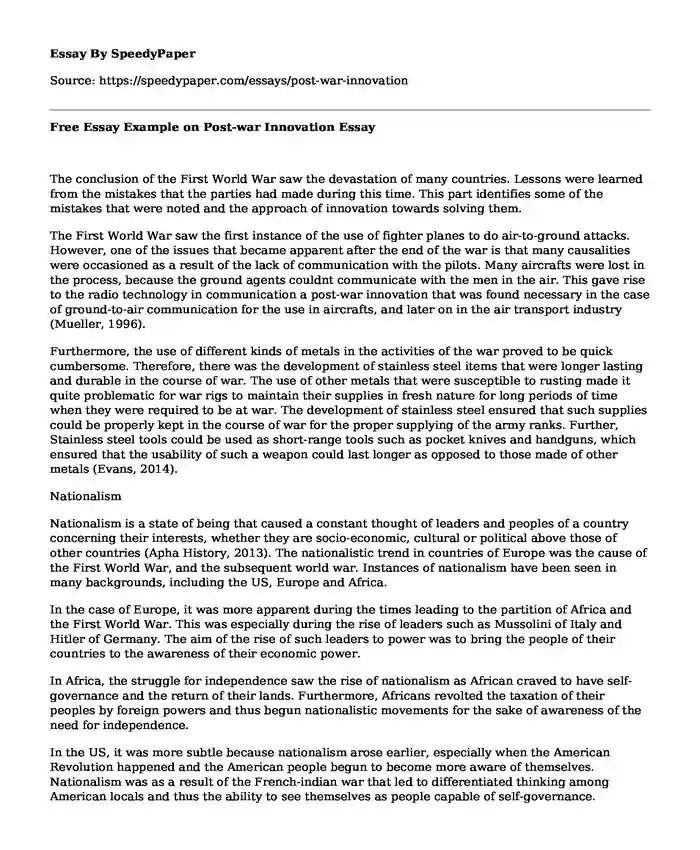
| Type of paper: | Essay |
| Categories: | History Technology Hitler World War 1 |
| Pages: | 3 |
| Wordcount: | 635 words |
The conclusion of the First World War saw the devastation of many countries. Lessons were learned from the mistakes that the parties had made during this time. This part identifies some of the mistakes that were noted and the approach of innovation towards solving them.
The First World War saw the first instance of the use of fighter planes to do air-to-ground attacks. However, one of the issues that became apparent after the end of the war is that many causalities were occasioned as a result of the lack of communication with the pilots. Many aircrafts were lost in the process, because the ground agents couldnt communicate with the men in the air. This gave rise to the radio technology in communication a post-war innovation that was found necessary in the case of ground-to-air communication for the use in aircrafts, and later on in the air transport industry (Mueller, 1996).
Furthermore, the use of different kinds of metals in the activities of the war proved to be quick cumbersome. Therefore, there was the development of stainless steel items that were longer lasting and durable in the course of war. The use of other metals that were susceptible to rusting made it quite problematic for war rigs to maintain their supplies in fresh nature for long periods of time when they were required to be at war. The development of stainless steel ensured that such supplies could be properly kept in the course of war for the proper supplying of the army ranks. Further, Stainless steel tools could be used as short-range tools such as pocket knives and handguns, which ensured that the usability of such a weapon could last longer as opposed to those made of other metals (Evans, 2014).
Nationalism
Nationalism is a state of being that caused a constant thought of leaders and peoples of a country concerning their interests, whether they are socio-economic, cultural or political above those of other countries (Apha History, 2013). The nationalistic trend in countries of Europe was the cause of the First World War, and the subsequent world war. Instances of nationalism have been seen in many backgrounds, including the US, Europe and Africa.
In the case of Europe, it was more apparent during the times leading to the partition of Africa and the First World War. This was especially during the rise of leaders such as Mussolini of Italy and Hitler of Germany. The aim of the rise of such leaders to power was to bring the people of their countries to the awareness of their economic power.
In Africa, the struggle for independence saw the rise of nationalism as African craved to have self-governance and the return of their lands. Furthermore, Africans revolted the taxation of their peoples by foreign powers and thus begun nationalistic movements for the sake of awareness of the need for independence.
In the US, it was more subtle because nationalism arose earlier, especially when the American Revolution happened and the American people begun to become more aware of themselves. Nationalism was as a result of the French-indian war that led to differentiated thinking among American locals and thus the ability to see themselves as people capable of self-governance.
Conclusion
The rise of nationalism can be seen to be the cause of many wars, including the First World War. The development of nationalism in later times was associated with international peace and well-being, and thus the formation of the international body The United Nations for the purposes of safekeeping these objectives.
References
Apha History. (2013). Nationalism as a major cause of nationalism. Retrieved from Alpha History: alphahistory.com/worldwar1/nationalism/
Evans, S. (2014). 10 inventions that owe their success to World War 1. Retrieved from BBC Berlin: www.bbc.com/news/magazine/26935867
Greenfield, L. (1992). Nationalism. New York: Wiley Library.
Mueller, J. (1996). Retreat from Doomsday. London: Basic Books.
Cite this page
Free Essay Example on Post-war Innovation. (2020, Nov 26). Retrieved from https://speedypaper.net/essays/post-war-innovation
Request Removal
If you are the original author of this essay and no longer wish to have it published on the SpeedyPaper website, please click below to request its removal:
- Essay Example on Inspirational Ways to Write More
- Essay Example about Poverty in Children
- Motivating Young People in Canada to Participate in Elections - Free Essay
- Essay Sample Dedicated to Substance Abuse Prevention Programs
- Essay Sample on China's Foreign Economic Policy
- Essay Sample Answering: Is the Law Always Right
- Historical events (less than 60 words):
Popular categories




